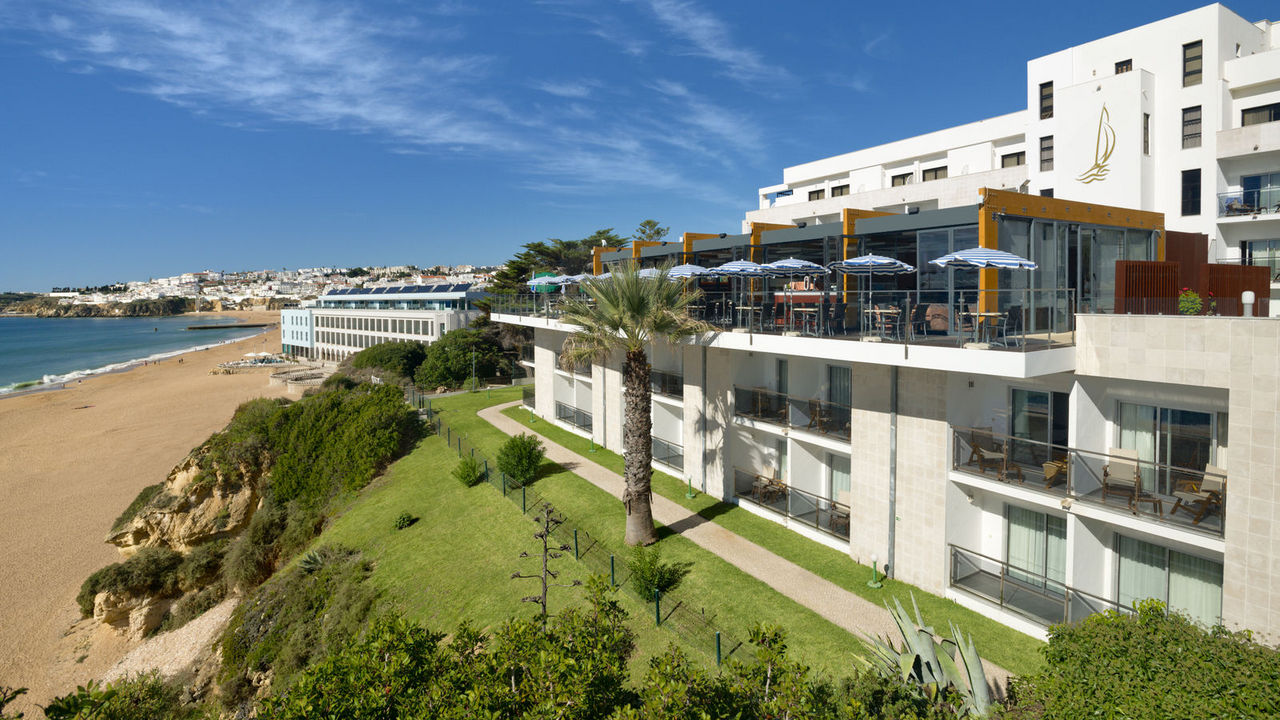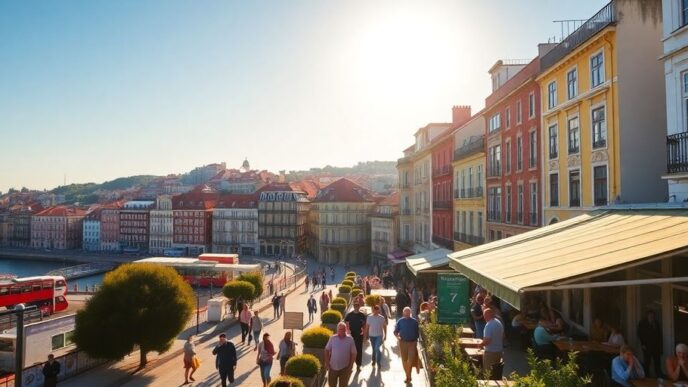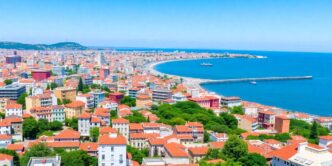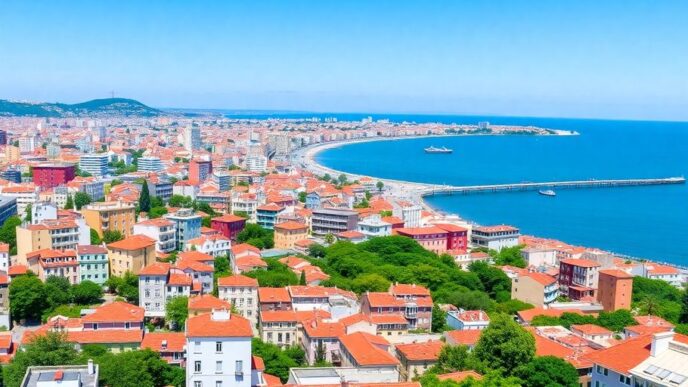Portugal’s tourism industry has been a magnet for foreign investors, drawing in billions in recent years and securing its position as one of the country’s most dynamic economic sectors. With beautiful landscapes, historic cities, and a mild climate, Portugal has established itself as a top destination, not only for travelers but also for global investors eager to capitalize on a flourishing tourism market. In recent years, investments have surged in hospitality, real estate, and emerging niche sectors like ecotourism, resulting in significant contributions to Portugal’s GDP and employment rates.
Foreign Investment in Portuguese Tourism: An Overview
Portugal’s economic growth has been significantly fueled by foreign direct investment (FDI), especially in tourism. According to recent reports from Banco de Portugal, FDI in Portugal reached a peak of €169 billion in 2023, with tourism receiving a major share. A large portion of this investment comes from countries like the United Kingdom, the United States, Germany, and increasingly, Brazil. Real estate and hospitality properties in Lisbon, Porto, and the Algarve region are among the most sought-after investment opportunities.
Prominent international hotel chains and investors have played a major role in Portugal’s hospitality landscape. For instance, Marriott International has invested heavily in new properties in Lisbon and Algarve, while the Hilton Group has expanded its footprint with luxury offerings in both urban and coastal areas. Meanwhile, domestic companies like Pestana Group have been capitalizing on partnerships with foreign investors, further solidifying Portugal’s standing as a luxury tourism destination.

Key Sectors of Tourism Investment
- Hospitality and Accommodation
Portugal’s hospitality sector is a primary destination for foreign capital. Recent years have seen record-breaking deals, such as the €300 million investment in 2022 by a consortium of German and British investors for a chain of eco-friendly hotels in the Algarve. According to the Portuguese Hotel Association, investments in new hotels and resorts across Portugal saw a 15% increase from 2021 to 2023, with demand focused on sustainable, high-end accommodations.The government has also introduced incentives to attract investors in the hospitality sector, such as tax breaks for projects that contribute to local economies or adopt sustainable practices. These initiatives have led to an increase in “green hotels,” where renewable energy and waste reduction strategies are implemented, aligning with Portugal’s commitment to sustainable tourism. - Real Estate and Property Investment
Real estate investment in tourism-related properties has been booming. Portugal’s Golden Visa program, which grants residency to non-EU investors purchasing property above a certain threshold, has been a strong driver in the industry. Since its inception, the program has generated over €6 billion, with the majority of investment concentrated in Lisbon and the Algarve.High-profile real estate purchases, like the recent acquisition of a coastal villa in Cascais by a major UK-based investment fund, underscore Portugal’s appeal as a destination for luxury property investments. Many foreign buyers are drawn not only by the stunning locations but also by Portugal’s favorable property tax rates and established property rights. - Ecotourism and Agritourism
The rise of ecotourism and agritourism reflects a global shift toward sustainable travel, and Portugal has quickly adapted to meet this demand. In regions such as the Alentejo, investors are backing projects focused on organic wine tourism, farm stays, and eco-resorts. In 2023, a significant €50 million investment was made by a French eco-hospitality group to establish eco-lodges and vineyard tours in Douro Valley, further enriching Portugal’s agritourism offerings.Portuguese government data indicates that agritourism projects have grown by nearly 30% in recent years, with ecotourism now accounting for 12% of the country’s tourism revenue. This trend aligns with global consumer preferences for eco-friendly travel options, opening doors for investors who want to enter the market while supporting Portugal’s commitment to environmental sustainability. - Niche Markets: Golf, Wine, and Cultural Tourism
Portugal is well-known for its cultural heritage and leisure activities that attract a diverse group of tourists. Golf tourism in the Algarve and wine tourism in the Douro Valley are two prime areas where foreign investment has boomed. According to Turismo de Portugal, the country welcomed over 1 million golf tourists in 2022, generating an economic impact exceeding €500 million. This surge in demand has led to major golf course expansions in the Algarve, often backed by British and Scandinavian investors.Similarly, wine tourism is increasingly popular, particularly in regions like Alentejo and Douro, where several new wineries have opened with foreign backing. A recent partnership between a Portuguese vineyard and a German investment group led to the development of a new wine resort in Alentejo, which not only offers wine-tasting experiences but also luxury accommodation with views of the vineyards. - Technology and Digital Transformation
As Portugal attracts younger, tech-savvy tourists, the role of technology in tourism cannot be overstated. Digital nomad communities have proliferated, with cities like Lisbon and Porto creating “startup villages” for remote workers. The government’s Digital Nomad Visa has further fueled this trend, as it allows tech professionals and entrepreneurs to live and work in Portugal for extended periods. This shift has encouraged investment in co-living spaces, high-speed internet infrastructure, and coworking hubs, with Lisbon being at the forefront.
The Government’s Role in Facilitating Investment
The Portuguese government continues to implement favorable policies to sustain and expand foreign investment in tourism. Tax incentives for businesses involved in sustainable tourism, financial support for hotel refurbishment, and the Golden Visa program have all contributed to making Portugal an attractive investment destination.
According to a statement by former Minister of Economy, António Costa Silva, “Portugal’s vision is to become not just a top tourist destination, but also a preferred choice for responsible investment in tourism. Our goal is to align profitability with sustainability.” This approach reflects Portugal’s drive to encourage long-term investments that boost the economy while preserving the country’s cultural and environmental assets.
Future of Tourism Investment in Portugal
Looking ahead, Portugal’s tourism industry is expected to see continued investment growth, particularly in sustainable tourism, real estate, and digital nomad services. The World Travel and Tourism Council (WTTC) forecasts that Portugal’s tourism sector will grow by an average of 3.5% annually over the next decade, driven largely by foreign investment. Investors are increasingly drawn by the stability, scenic landscapes, and cultural richness Portugal offers, making it a wise long-term investment destination within Europe.













